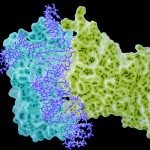Lien vers Pubmed [PMID] – 19133272
J. Mol. Biol. 2009 Mar;387(2):407-15
Fibrillar protein aggregates (amyloids) are involved in several common pathologies, e.g., Alzheimer’s disease and type II diabetes. Accumulating evidence suggests that toxicity in amyloid-related diseases originates from the deposition of protein aggregates on the cell membrane, which results in bilayer disruption and cell leakage. The molecular mechanism of damage to the membrane, however, is still obscure. To shed light on it we have performed coarse-grained molecular dynamics simulations of fibril-forming amphipathic peptides in the presence of lipid vesicles. The simulation results show that highly amyloidogenic peptides fibrillate on the surface of the vesicle, damaging the bilayer and promoting leakage. In contrast, the ordered aggregation of peptides with low amyloidogenicity is hindered by the vesicles. Remarkably, leakage from the vesicle is caused by growing aggregates, but not mature fibrils. The simulation results provide a basis for understanding the range of aggregation behavior that is observed in experiments with fibril-forming (poly)peptides.

